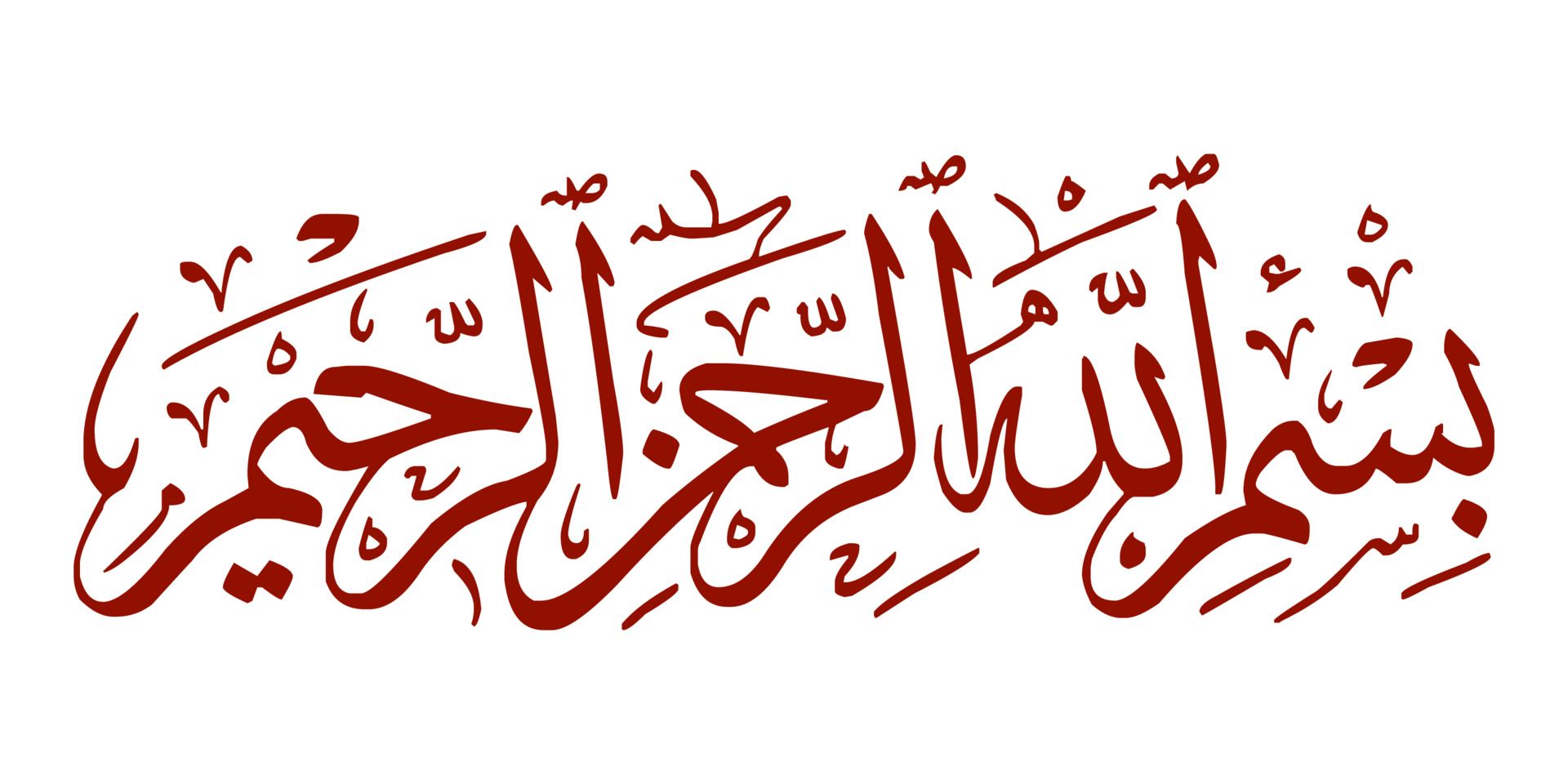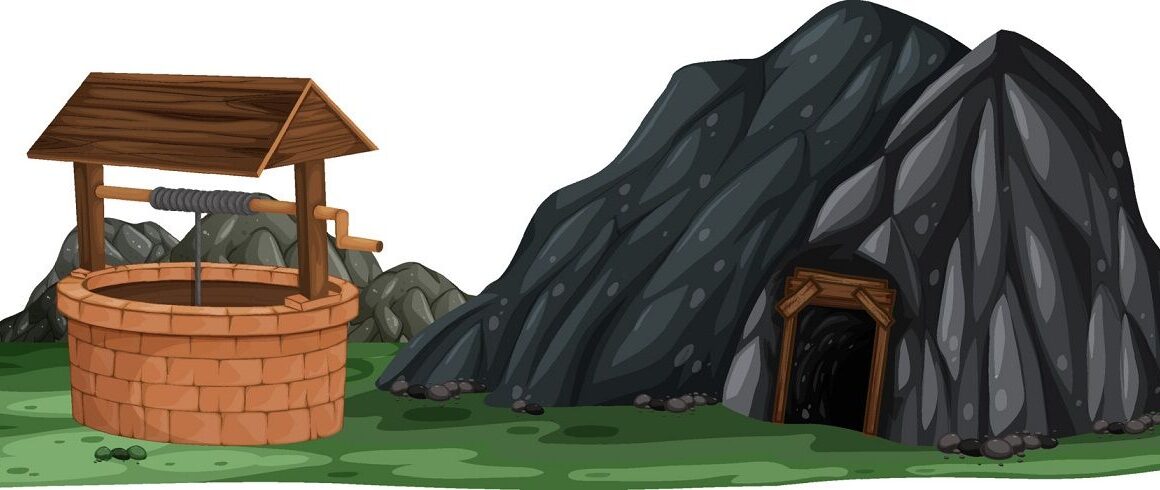Surah Al Ikhlas Tafsir
Once upon a time, some people in mecca used to worship statues and thought they were the greatest Gods ever. These people used to tease the Prophet and say to him,
These are Gods, “tell us, who is your God, the one you talk about?”
Soon later, Surat al Ikhlas was revealed to answer their question.
Bismillahir Rahmanir Rahim
بِسْمِ اللَّـهِ الرَّحْمَـٰنِ الرَّحِيمِ
قُلْ هُوَ ٱللَّـهُ أَحَدٌ
Say: He is Allah, the One (and only)
Why does the verse start with Qul or Say? He could have just said He is Allah without Saying!
One of the reasons for this is that when Allah said to the Prophet you have to say this to answer their question, the Prophet copied every word that Allah said without any change.
Another reason is it also emphasizes the importance of the message emphasizing that these words are from Allah Himself. Allah is the most significant name for God. The name Allah contains all attributes of perfection. This means the names al Rahman, al Rahim, al Khaliq, al Jabbar, and so on are all Allah’s names.
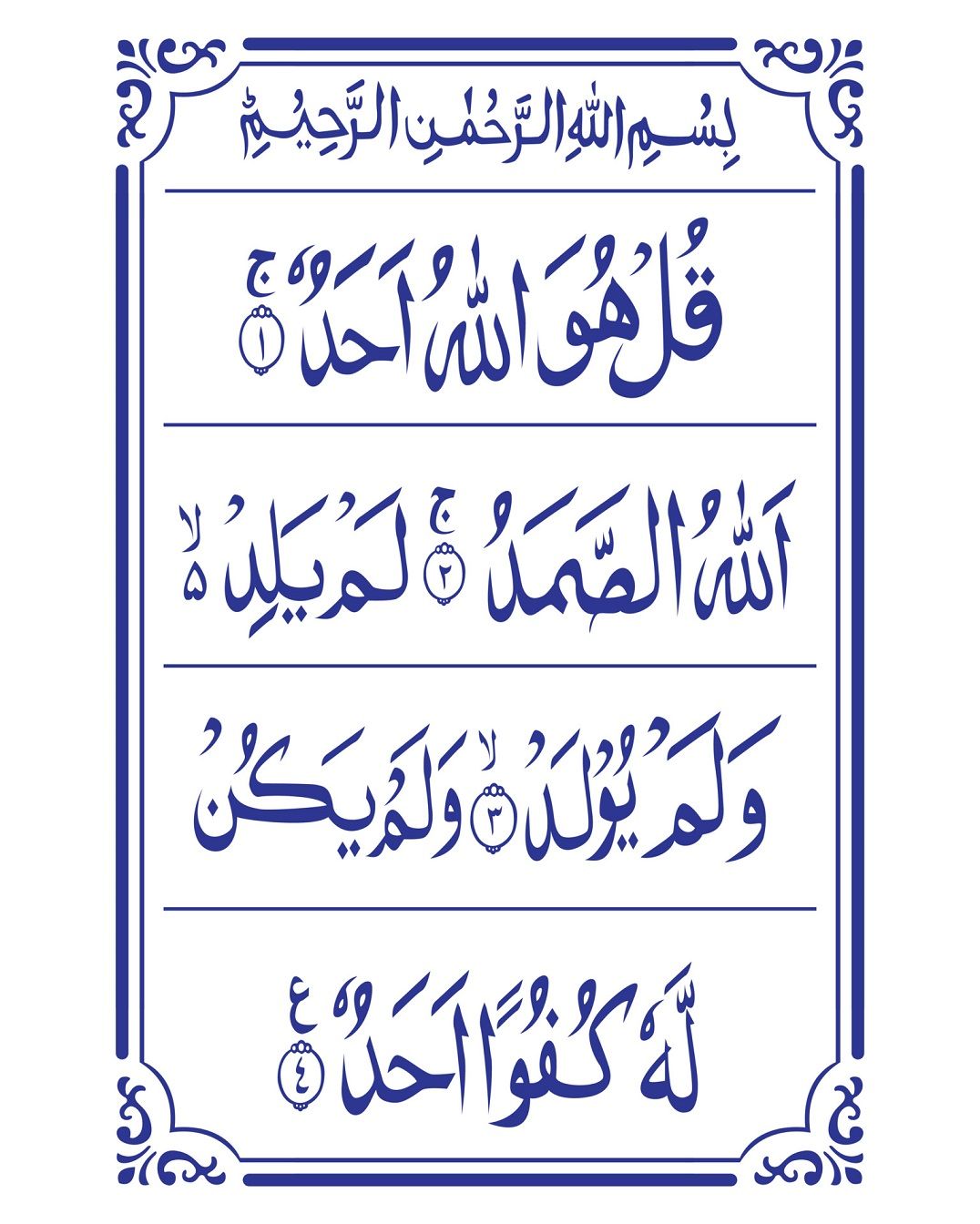
The word “Ahad” means One. This word means there is only One and only God. It doesn’t mean He is number one and then there is a number 2.
A number 3, NO. Allah is the one and only God.
This verse also means Allah’s attributes are all one and can never be separated from Allah.
The next verse says
ٱللَّـهُ ٱلصَّمَدُ
Allah is Eternal
Samad has many meanings, one of
them is Eternal, which means Allah
It is forever living without any end. Another meaning is that Allah is not in need of anyone or anything.
The next verse says
لَمْ يَلِدْ وَلَمْ يُولَدْ
He is not born, and He does not give birth.
This verse means that Allah was always there and did not come from anything or have any children. Unlike us, we all came from our parents, and some of us have children. Allah is not like us.
The next verse says
ahad وَلَمْ يَكُن لَّهُۥ كُفُوًا أَحَدٌ
And there is nothing like Him.
This ayat means Allah is free from any qualities that other things have.
For example, a human has a body; animals eat and drink, and rocks are minerals. Allah is far beyond what you can describe and has no equal.
This Surah is so powerful even though it is short. It all points to the Oneness of Allah and how Unique Allah is.
Believing in the Oneness of Allah can be understood through different levels.
The belief in the Oneness of Allah in Himself or essence means thinking that there is only one God. Some people believe there are other Gods; some believe there is a god of rain, lightning, etc.
This Surah teaches us that only one God is unique from anything you can describe.
There is the Oneness of Allah in His attributes. This means believing in all the good attributes.
Are not separate from Allah Himself. In other words, when we say that He is all-knowing or all-powerful, we do not mean his Knowledge or Power is separate from who he is and that he acquired it.
When we say a person knows, we know that they did not have that knowledge at birth and that it was acquired. And when the person grows old, their knowledge may change or reduce. This is not the case for Allah.
There is the Oneness of Allah in His actions. This means that Allah not only created everything. But He still nurtures the entire universe, even when we get things from others (such as lawful. wages from an employer), it is actually Allah is giving us but through someone else.
Or when we are sick, and a doctor cures us, Allah cures us through the doctor and the medicine, and so on.
There is the Oneness of Allah in Obedience. This means obeying Allah and his commands. If Allah says to respect your parents, we must do so. If Allah says to obey the Prophet and Ulil Amr, we must do so. Committing sins and not obeying Allah is a sign that we don’t have true faith in the Oneness of Allah.
There is Oneness of Allah in Worship. This means we should not worship anything besides Allah. Sometimes people tend to show off which leaves worship not just for Allah but for people.
The Sura is about refining our faith and purity in Allah, the more you refine the concepts in your mind and in your heart, the more sincere you will become. Hence that is why one of the reasons this Sura was called surat Al Ikhlas, the sincerity.
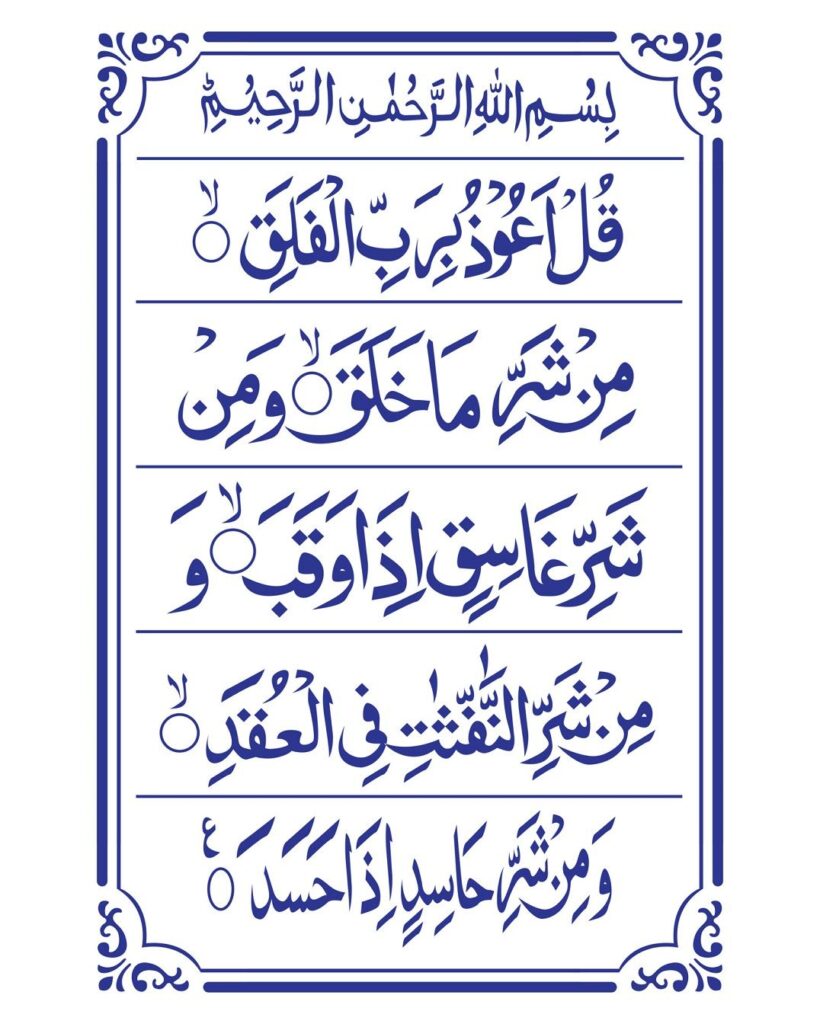
Surah Al-Falaq Tafsir
Some narrations in certain books said this Surah was revealed when some magicians practiced magic on the Prophet Muhammad, and he became sick. The angel Gabriel came down and told the Prophet that the spell was in a well.
The Prophet told Imam Ali to bring the spell, untie the knots, and recite surat al Falaq and Surat al Naas.
Then the Prophet was not sick anymore. This story has been rejected by scholars not just because the narration is weak but because the Quran tells us, “it is the wicked ones that say that he is bewitched.”
- “they have left the right path” (25:8-9)
Allah swears that the (53:2-3) Prophet is not deluded and does not speak out of his desires, and Allah also says (4:80)
whoever obeys the Prophet has obeyed Allah.
Does it make sense that Allah is telling us to follow the Prophet, but the Prophet is bewitched? Of course not.
The Surah starts with
Bismillahir Rahmanir Rahim
بِسْمِ اللَّـهِ الرَّحْمَـٰنِ الرَّحِيمِ
Qul a’uthu bi rabbil falaq
قُلْ أَعُوذُ بِرَبِّ الْفَلَقِ
Say: I seek protection with the Lord of the Daybreak.
The word Falaq originally meant to split and separate. Like when the day pieces through the night, it is called Falaq.
Some have said Falaq means everything that is created splits and separates, like a baby from its mother, some animals through eggs, plants split through seeds, springs through the soil, rain splits through the clouds, etc.
Allah is the one that splits the darkness and evils and brings light and Guidance.
The next verse says
Min sharri maa khalaq
مِن شَرِّ مَا خَلَقَ
From the evil which He has created
Allah says that he has created everything Good.
(32:7) this ayah means we seek protection from what we consider evil. Earthquakes and volcanos are good for the earth. A snake’s venom is good for the snake as it protects itself.
But these things can sometimes harm us, so we label them evil. We are asking Allah to protect us from such things.
The next verse says
Wa min sharri ghaasiqin itha waqab
وَمِن شَرِّ غَاسِقٍ إِذَا وَقَبَ
And from the evil of the night when it comes scary and harmful creatures, robbers and other evil things usually attack at night. This could also be spiritual darkness.
Darkness when you are stuck in the world with no answers and need the light of Guidance. We ask Allah to protect us from these evil creatures, the people, and this spiritual darkness.
The next verse says
Wa min sharrin naffaathaati fil
‘uqad وَمِن شَرِّ النَّفَّاثَاتِ فِي الْعُقَدِ
And from the evil of those who blow on knots
Who are the evil ones who blow knots? Some have said they are witches and magicians who tie knots on a string and blow into it, practicing magic.
Magic is forbidden in Islam. Some have also said they are certain people who murmur things into the ears of others loosening the knots in their hearts, weakening their will, and letting out secrets. They start behaving as if they are under a magic spell.
The next verse says
Wa min sharri haasidin itha hasad
وَمِن شَرِّ حَاسِدٍ إِذَا حَسَدَ
And from the evil of the envious (ones) when they envy
Envy means you hate what that person has and wish it was taken away from them and given to you instead. The envious people feel jealous and hold grudges.
Envy is one of the major sins in Islam.
So from the start of the Sura, we have been seeking help and protection with Allah from 4 things.
All the evil things that we consider evil. All the evil things that come in the night
All the evils of those that blow knots and loosen our faith with their temptations
All those that are envious.
We seek protection from Allah, Rabbil Falaq, the Lord who splits the evil and darkness and brings light and Guidance.
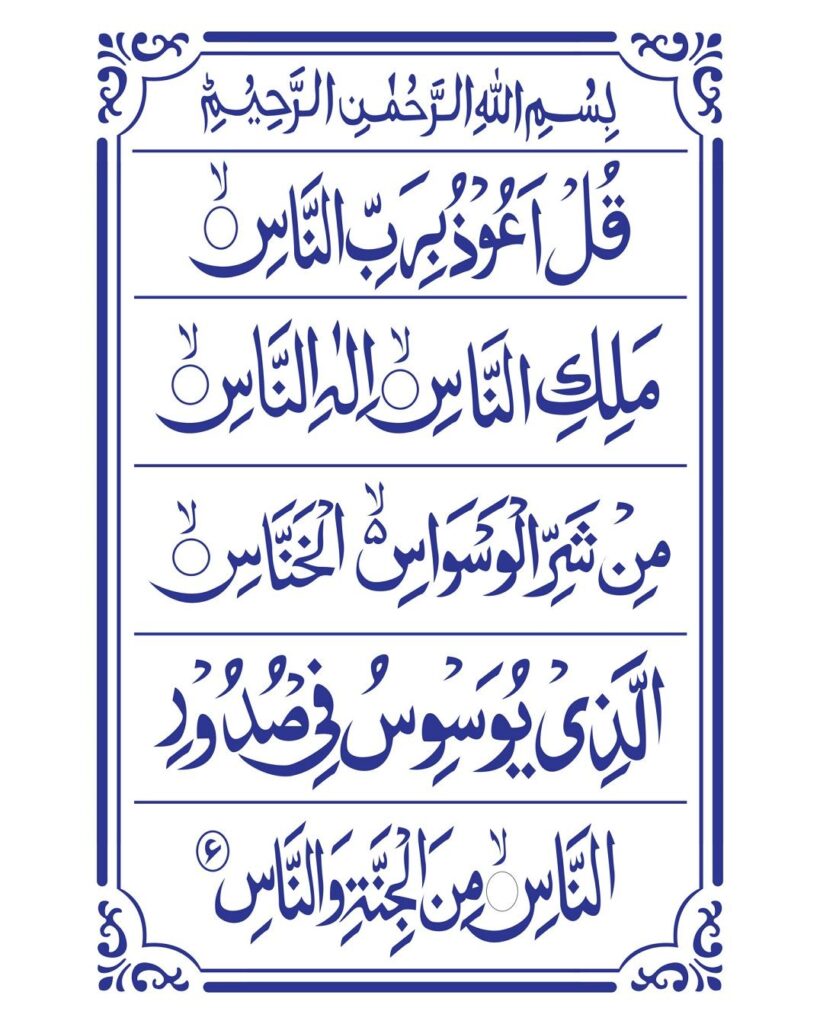
Surah An-Nas Tafsir
Surat An-Nas is the last chapter of the Holy Quran.
According to narrations, Surat al Falaq and Surat An-Nas were revealed together with a difference that in Surat al Falaq, we are
asking for protection from Allah from external evils, and in Surat an-Nas, we are asking for protection with Allah from internal and hidden evils.
Surat an-Naas starts with
Bismillahir Rahmanir Rahim
بِسْمِ اللَّـهِالرَّحْمَـٰنِ الرَّحِيمِ
Qul a’uthu bi rabbin naas قُلْ أَعُوذُ
بِرَبِّ النَّاسِ
Say: I seek protection with the Lord of all the people
The word Rabb means nurturer.
The one who takes care of us feeds and protects us. Allah is the real Rabb of people.
The next verse says
Malikin naas
مَلِكِ النَّاسِ
The King of all the people
When we think of a king, we think of the ruler of a country or something.
Allah is the real KingKing, not just the KingKing of a country, but the KingKing of the entire universe.
The next verse says
Ilahin naas
إِلَهِ النَّاسِ
The God of all the people
We are asking Allah to protect us with three of His magnificent attributes.
Ar Rabb – the nurturer, Al-Malik – the King, al Ilah- The God.
But protect us from what?
The next verse explains.
Min sharril waswaasil khannaas
مِن شَرِّالْوَسْوَاسِ الْخَنَّاس
From the evil of the temptations of the khannaas
The word “khannaas” means to hide and come back, and that is Satan.
He comes and tempts us to commit sins, hides, and returns over and over.
So this verse means we are seeking protection from Allah from the evil tempter who runs and hides when Allah’s names are mentioned.
The next verse says
Allathi yuwaswisu fii suduurin naas الَّذِي
يُوَسْوِسُ فِي صُدُورِ
النَّاسِ
The one who tempts into the hearts of the people
He tempts evil things and suggestions that may tempt us to commit sins.
The next verse says
Minal jinnati wan naas مِنَ الْجِنَّةِ
وَ النَّاسِ
From the Jinn and the people
The Jinn are another creation of Allah that
we cannot see.
Some of them are good, and some of them commit evil.
(55:15), (72:11)
So now we know that “waswaasil khannaas” can also be from the Jinn or the people.
So, from the Surah’s start, we seek help from Allah with three of His attributes.
Ar Rabb, al Malik and al Ilah.
Sometimes Waswasa can lead us to reject these three attributes.
Sometimes from this waswasa you may think you are the Rabb or nurturer.
These temptations got you thinking as if you are the real nurturer of our children or the real nurturer of your garden and so on.
Sometimes from this waswasa you may think you are the malik or the King.
These temptations got you thinking as if you were the King of the neighborhood, the King of the house, my room, and so on.
Sometimes from this waswasa you may think you are the Ilah or God, but in reality, the only God you have taken your desires, just as the Quran says, “Have you seen he who has taken as his God his [own] desire” (45:23)
When we say we seek help with Allah in this Surah, we are saying in Rabbin Nas(humankind) that we accept Allah as the real Rabb and Nurturer, and we hope for His Guidance.
When we say Malikin Nas – we must become obedient to our true KingKing in all matters.
When we say Ilahin Nas – We need to worship Allah truly and avoid worshipping ourselves and our ego or others.
A person who truly believes in these three attributes of Allah will crush the ego and will be safe from the evil temptations of satan, the Jinn, and the people who tempt us into committing sins.
You can read other tafsir of Surahs here

